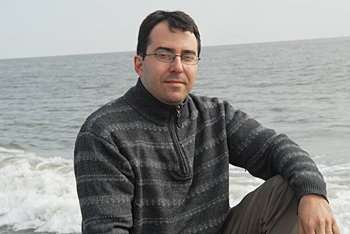
Fabrice Veron, assistant professor of physical ocean science and engineering in the College of Marine and Earth Studies, has received a NSF Faculty Early Career Development Award for a research project that will help scientists more accurately determine the strength of hurricanes by helping them understand the physics of interactions between the ocean and the air moving above it.
The highly competitive NSF Career Award is bestowed on researchers deemed most likely to become the academic leaders of the 21st century.
“This award is a great testament to the high regard in which Dr. Veron is held by his mentors and peers,” said Nancy Targett, dean of the College of Marine and Earth Studies (CMES). “His strong background in engineering and ocean physics, his enthusiastic and vigorous research program and his challenging and stimulating instructional offerings in the college highlight his successes to date as a CMES faculty member.”
Veron, who joined the UD faculty in 2002, said his work could have implications not only for coastal populations but also for industries ranging from agriculture to energy.
“In the past 30 to 40 years we've made a lot of progress in being able to predict where hurricanes are going to land,” said Veron, “but we haven't made much progress on predicting how strong they're going to be. We're not very good at estimating the intensity of a hurricane.”
That, he says, is because scientists don't have a good understanding of what's known as airflow separation over the waves. Veron's five-year $583,671 grant will support a project that is aimed at figuring out the physics behind that mystery.
He explained that over the ocean, wind is slowed, or dragged down, by the water, which has the ability to capture some of the wind's energy and create currents and waves. However, evidence suggests that sometimes the wind is not able to follow the up and down movement of the waves and instead lifts off the surface and skims the wave crests.
“If the wind is bouncing and skipping on top of the waves, it's not in contact with the full surface of the ocean,” he said, “and it's going potentially much faster (than it would otherwise).”
But there's been no direct observation of this “skipping” effect at sea and there's very little observation of it in the lab, apart from measurements Veron has made in the wind-wave tank at UD's Air-Sea Interaction Laboratory. By measuring the slope of the waves and considering the roughness of the surface, the wind speed and other variables, Veron hopes to be among the first to observe and quantify the airflow separation and the waves' impact on surface drag both in the lab and the field.
Giving scientists a better idea of how the ocean and the atmosphere interface won't be the only result of his work, however. The NSF grant supports an educational initiative in which Veron will teach classes in a summer camp for promising high school students and develop materials to be put on a Web site for teachers to access.
The NSF prize is not the first accolade Veron has earned, Targett said. While pursuing his doctorate in oceanography from the Scripps Institution of Oceanography, he received several prestigious awards, including the Edward A. Frieman Director's Prize for excellence in research. In 2005, he received the Office of Naval Research Young Investigator award.
This latest career award will further assist Veron in pursuing his innovative approaches to research and education, she said.
Article by Elizabeth Boyle
Photo by Steven Billups

